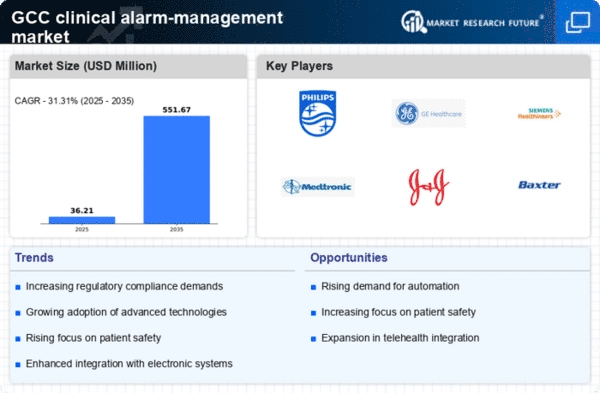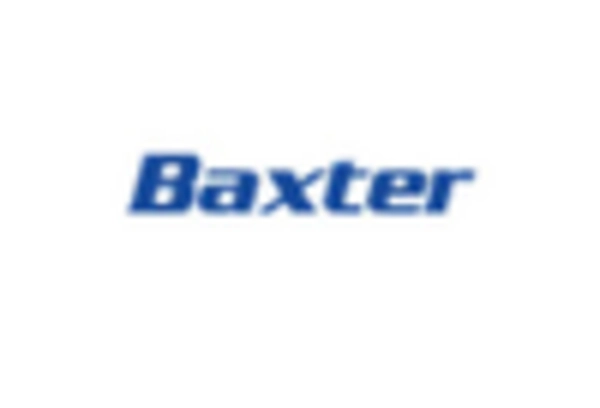Growing Awareness of Alarm Fatigue
Awareness of alarm fatigue is increasingly influencing the clinical alarm-management market in the GCC. Alarm fatigue occurs when healthcare staff become desensitized to frequent alarms, leading to potential oversights in patient care. Recent studies indicate that alarm fatigue affects nearly 80% of nursing staff, prompting healthcare organizations to seek solutions that reduce unnecessary alerts. This growing recognition of the issue is driving investments in alarm management technologies that prioritize critical alerts and minimize non-essential notifications. As healthcare providers strive to enhance staff efficiency and patient safety, the clinical alarm-management market is likely to benefit from innovations aimed at addressing alarm fatigue and improving clinical outcomes.
Shift Towards Value-Based Care Models
The clinical alarm-management market is witnessing a shift towards value-based care models, which emphasize patient outcomes and cost-effectiveness. In the GCC, healthcare providers are increasingly adopting strategies that focus on delivering high-quality care while managing costs. This transition is prompting hospitals to invest in clinical alarm management systems that enhance patient monitoring and reduce the incidence of adverse events. By implementing effective alarm management solutions, healthcare facilities can improve patient satisfaction and reduce readmission rates, which are critical components of value-based care. As this trend continues to gain traction, the clinical alarm-management market is expected to grow, driven by the need for systems that align with the principles of value-based healthcare.
Technological Advancements in Healthcare
Technological advancements are significantly influencing the clinical alarm-management market, particularly in the GCC region. The integration of Internet of Things (IoT) devices and artificial intelligence (AI) into alarm systems is transforming how healthcare providers manage alerts. These technologies enable real-time monitoring and data analytics, allowing for more accurate and timely responses to patient needs. For instance, hospitals utilizing AI-driven alarm systems have reported a 25% increase in alarm accuracy, which directly correlates with improved patient outcomes. As healthcare facilities continue to adopt these cutting-edge technologies, the clinical alarm-management market is expected to expand, driven by the demand for smarter, more efficient alarm solutions that enhance clinical workflows and patient safety.
Rising Demand for Patient Safety Solutions
The clinical alarm-management market is experiencing a significant increase in demand for solutions aimed at enhancing patient safety. As healthcare facilities in the GCC region increasingly prioritize patient outcomes, the need for effective alarm management systems becomes paramount. According to recent data, hospitals that implement advanced alarm systems report a reduction in alarm fatigue by up to 30%. This trend indicates a growing recognition of the importance of minimizing false alarms and ensuring that critical alerts are prioritized. Consequently, healthcare providers are investing in technologies that streamline alarm notifications, thereby improving response times and overall patient care. The emphasis on patient safety is likely to drive the clinical alarm-management market forward, as stakeholders seek to adopt innovative solutions that align with best practices in healthcare delivery.
Increasing Regulatory Focus on Healthcare Quality
An increasing regulatory focus on healthcare quality and safety standards in the GCC is shaping the clinical alarm-management market. Regulatory bodies are emphasizing the need for effective alarm management protocols to mitigate risks associated with alarm fatigue and miscommunication. Compliance with these regulations is becoming a critical factor for healthcare institutions, as failure to adhere can result in penalties and diminished reputations. As a result, hospitals are investing in comprehensive alarm management systems that not only meet regulatory requirements but also enhance overall patient care. This regulatory landscape is likely to propel the clinical alarm-management market, as healthcare providers seek to align their practices with evolving standards and improve their operational efficiencies.
















